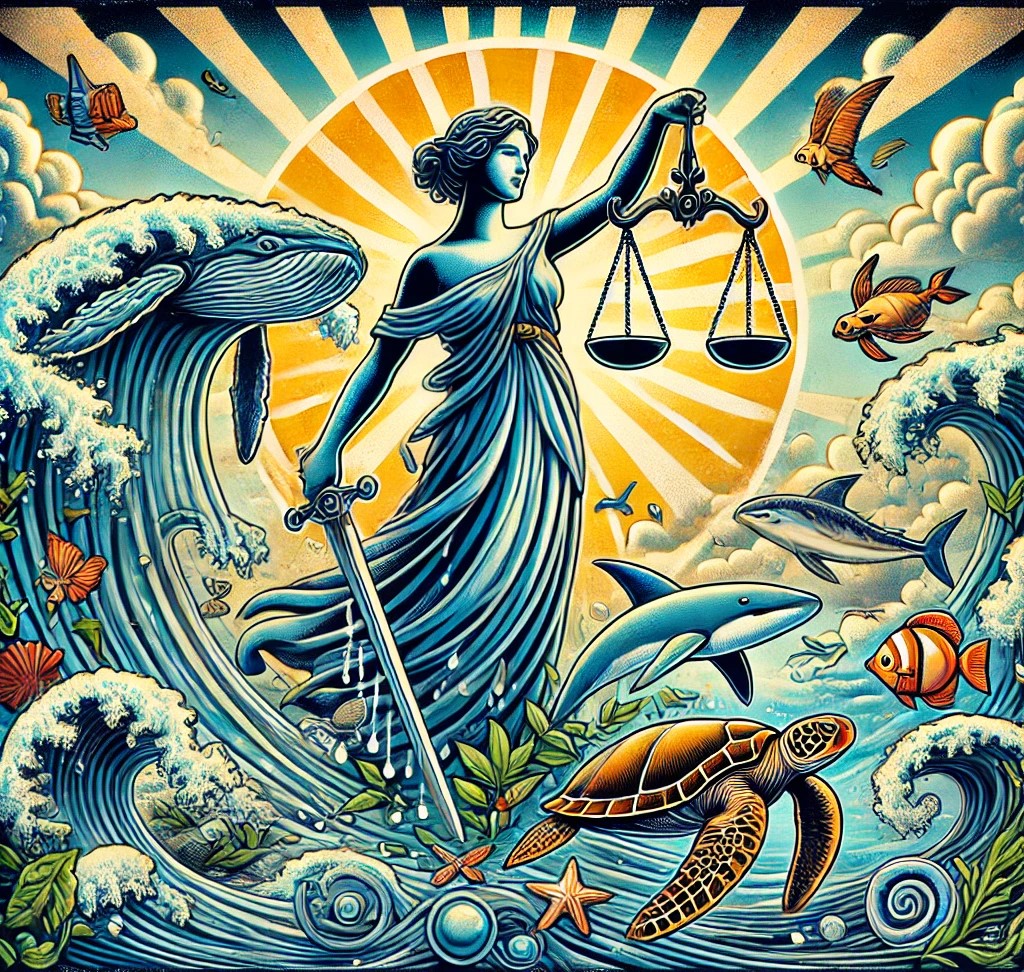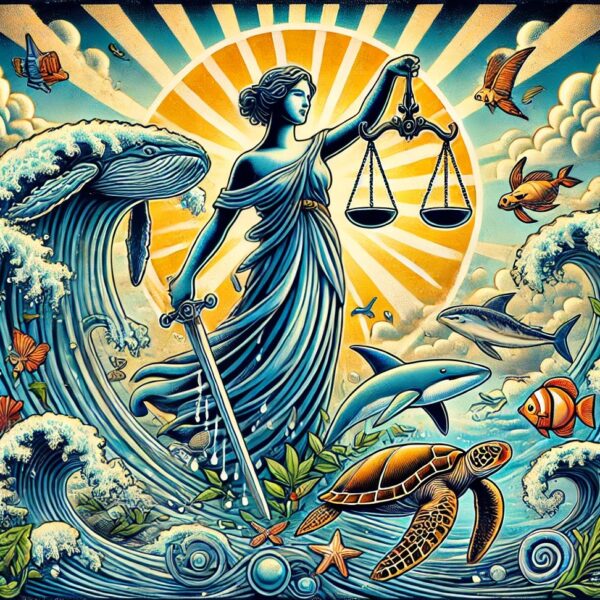In the face of the global climate crisis, the decline of biodiversity, anthropogenic pollution, and increasingly destructive industrial projects, the recognition of rights for Nature is one of the necessary levers to engage States and communities of actors, both private and public, towards ecological transition. For about fifty years, local, national, or international initiatives have gradually advanced this right.
Interview with Bernard Mossé, scientific director of the NEEDE Mediterranean association, with Victor David, lawyer, research officer at the Institute for Research and Development (IRD) and member of the Mediterranean Institute of Biodiversity and Ecology (IMBE).
#3 The Oceans and Seas as Legal Entities
Bernard Mossé: Rich from this experience in New Caledonia, which you continue to support, you have initiated an action for the recognition of the Mediterranean as a legal entity. Could you outline the history of this process that you have undertaken?
Victor David: In 2016, the Loyalty Islands province of New Caledonia adopted what is called the "unitary principle of life," which states that man and nature are one. Based on this principle, the Province commits to recognizing elements of nature as legal persons endowed with their own rights. Thus, the principle was established in 2016 in the environmental code.
Bernard Mossé : Is this at that moment the notion of "legal person"?
Victor David: It is indeed the term already used for rivers and other elements of Nature recognized as subjects of law in different countries. We then realize that to implement this unitary principle of life, it must be transformed into concrete legal texts, that is to say, deciding which species or elements of nature will be able to benefit from the application of this unitary principle of life; how to organize it since, in French law, we do not have an example.
In 2017, the first United Nations Conference on Oceans took place, and as a research institute, we were approached by the government of New Caledonia, which itself was approached by the French government, to make proposals to the United Nations: what are called "voluntary commitments."
And so, I, who work on the legal personality of elements of nature in the Kanak environment, proposed to work on the idea of the Pacific Ocean as a legal person, as a natural legal entity…
Bernard Mossé: What is this proposal based on?
Victor David: This intellectual approach comes from two elements.
On the one hand, it is the observation of an ocean and marine life deteriorating due to climate change, plastic pollution, overfishing, and industrial fishing that exploits certain marine species to extinction, not to mention the projects for the exploitation of underwater mineral resources.
On the other hand, there was the fact that I was in Oceania. Most Oceanians have a particular relationship with the sea; it is not just a maritime space: the Ocean is a god. In Polynesian and Melanesian mythologies, there is this anthropomorphic idea of the personification of the ocean.
And so considering the ocean as a legal person does not pose a problem intellectually since it is already a person in the minds of Oceanians, a divine person, in an animistic conception of Nature. In the past, the Ocean was considered a deity, and that was enough to protect it: there were customary rules based on this respect. However, this has been lost over time, with colonization, Christianization…
In a way, the ocean has become an object: generally, we have witnessed an objectification of nature. Recognizing the ocean as a holder of rights in our current legal orders would allow us to continue to protect it.
This is what I proposed as a voluntary commitment to the United Nations. To study the obstacles as a researcher, as a lawyer. To see what it yields…
BM: How did you go about giving weight to this proposal?
VD: I involved colleagues from Fiji, New Zealand, and Australia: we started to have exchanges. These were very solemn videoconferences and very complicated to organize. My first task was to ask: is there anything in international maritime law today that opposes an ocean being a legal person?
We are not going to overturn the world order, so we cannot modify, for example, the Montego Bay Convention of 1982… We need to find a way within the margins of maneuver available to us. I then realized that indeed nothing in international maritime law opposed it.
The Nouméa Convention, one of the regional conventions on the seas, concerning the Pacific Ocean, even states that States must strive to conclude bilateral or multilateral agreements, including regional or sub-regional agreements, for the protection, development, and management of the marine and coastal environment of the convention area...
Pacific coastal States therefore had this possibility of entering into an agreement that recognizes the Ocean as a legal person.
BM: Wasn't there a difficulty related to territorial waters, to the areas over which States are sovereign?
VD : In fact, the Pacific Ocean, unlike the Mediterranean, is immense, and international law rules allow each State to have an exclusive economic zone of 200 nautical miles, that is to say, about 370 kilometers from the baseline, including territorial waters. This is a totally legal definition, but in fact, it is part of what is called a legal degradation of State sovereignty.
The territorial waters are strictly under the authority of the coastal State just like the land, you can prohibit anything you want there. Except for the free movement of ships.
The economic zone allows the exclusive use of everything found there as resources, oil, gas, minerals, rare earths, or fish. If someone else wants to use it, they need the agreement of the coastal State.
Beyond that, there are international waters, and it is the international community that manages them.
So I had launched the idea: if this is the will of the coastal States, they can register maritime spaces, each within its jurisdiction, as subjects of law.
BM: As a subject of law, or, even at that time, had you advanced the novel notion of natural legal entity?
VD: No, not yet at that time. In 2017, I was not yet using the term natural legal entity; I arrived at it later on. On the one hand, in France in particular, there was a great deal of skepticism among the legal community about this idea of legal personality for nature, and even a number of very strong oppositions, either unconvinced or simply pessimistic. Sometimes for philosophical reasons.
BM: Are you referring to the dialogue between Michel Serres and Bruno Latour on this point?
VD: There is indeed the idea that granting rights to nature would be anti-humanist. With the consequence of a rivalry between Nature and Humans. Others think that this can be understood in indigenous contexts, but that it cannot be the case in Europe, in the Western legal system…
This debate was directly related to the ongoing work in the Loyalty Islands province. Was I not on the wrong track? Because it is a researcher’s work, a scientist, I do not want to act simply out of conviction. I am not an activist or a campaigner. My role was simply to advise the province to ensure the legal security of its environmental law.
Another event also led me to consider opting for a solution other than legal personality, which implies rights, duties, and responsibilities for those who benefit from it: this is the example of India in 2017. The High Court of one of the federal states, Uttarakhand, recognized the Ganges as a legal person. And in the mechanism of recognition of the rights of nature, alongside the enumeration of rights recognized to it, the designation of human representatives of this element before the courts and the Court was provided.
BM: This is one of Bruno Latour's objections: a right of nature requires rights and duties. But also representatives.
VD: Exactly. Of all the questions regarding the rights of nature, this is a fundamental one: we need to know who represents it. I have come to the idea today that we must be extremely flexible on this idea because there is indeed no single rule. There are several scenarios. In Ecuador, it is a popular initiative. Any Ecuadorian citizen can go to protect and assert the rights of nature before a court.
In New Zealand, there are two spokespersons, guardians of the river: one designated by the State, the other by the Maoris, with some sort of board of directors to support: there are two faces, two human faces, as it is said. We see that in Bolivia, Ecuador, Colombia, etc., all over the world, there are different paths.
In mainland France, there has been talk of the Loire Parliament, the Rhône Assembly. On rivers that span several hundred kilometers, it is extremely complicated to know who is legitimate to speak on their behalf…
The Indian court had therefore appointed high-ranking officials of the federal state ex-officio for the Ganges. However, those in office at that time, fearing being held responsible for any damage caused by the Ganges, approached the Supreme Court of India, which suspended the decision of the federal court. In short, the attributes of a legal person do not necessarily suit all elements of Nature.
Obviously, this is an even more crucial question for the rights of the Mediterranean.
This is why I advocate for the creation of a new category of subjects of rights, natural legal entities, with a legal regime to imagine and create.

